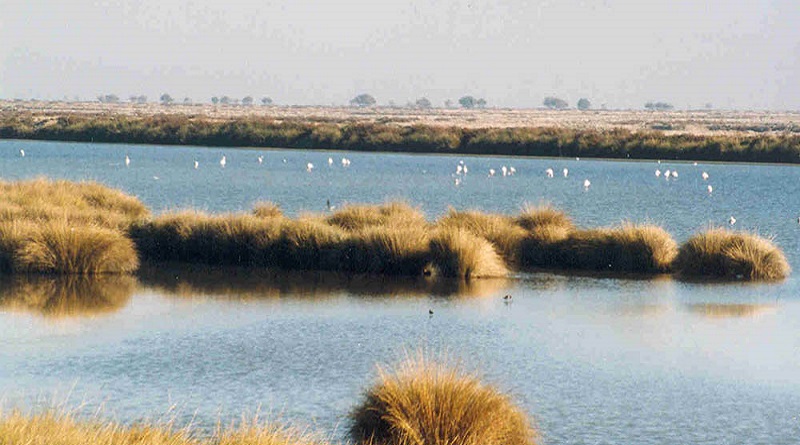Largest river, wetland restoration initiative in history launched at UN Water Conference
A coalition of governments on Thursday 23 March 2023 launched the Freshwater Challenge – the largest ever initiative to restore degraded rivers, lakes and wetlands, which are central to tackling the world’s worsening water, climate and nature crises.
Announced at the UN Water Conference in New York, the Freshwater Challenge aims to restore 300,000km of rivers – equivalent to more than 7 times around the Earth – and 350 million hectares of wetlands – an area larger than India – by 2030.
Along with water supplies, healthy freshwater ecosystems provide a wealth of benefits to people and nature, and are critical to mitigating and adapting to climate change, and achieving the Sustainable Development Goals (SDGs). Yet one-third of the world’s wetlands have been lost over the past 50 years, and we are still losing them faster than forests. Rivers and lakes are the most degraded ecosystems in the world, with fish populations, many of which are vital for community food security, pushed to the brink.
Released this week, the IPCC’s sixth assessment report outlines the serious impacts of climate change on freshwater ecosystems, highlighting the need to protect and restore them to enhance adaptation and build resilient societies, economies and ecosystems.
Championed by the governments of Colombia, the Democratic Republic of Congo, Ecuador, Gabon, Mexico and Zambia, the Freshwater Challenge calls on all governments to commit to clear targets in their updated National Biodiversity Strategies and Action Plans, National Determined Contributions and National Implementation Plan for the SDGs to urgently restore healthy freshwater ecosystems.
Susana Muhamad, Minister of Environment and Sustainable Development, Colombia: said “This initiative is in line with the priorities of the National Development Plan 2022-2026, which will allow the country to strengthen Territorial Planning around Water by protecting all water systems from a perspective of water as a common resource and fundamental right. This implies the participation of communities to resolve socio-environmental conflicts, respecting cultural diversity and guaranteeing the conservation of biodiversity”.
The Freshwater Challenge is a country-driven initiative with an inclusive, collaborative approach to implementation, where governments and their partners will co-create freshwater solutions with indigenous people, local communities, and other stakeholders.
Building on the Global Biodiversity Framework agreed in Montreal in December 2022, which included the restoration of 30% of the world’s degraded ‘inland waters’, the Challenge will contribute to the UN Decade on Ecosystem Restoration. The UN Decade is a drive to revive our planet, co-led by the United Nations Environment Programme (UNEP) and the UN Food and Agriculture Organization (FAO).
Inger Andersen, UNEP Executive Director said, “Healthy rivers, lakes and wetlands underpin our societies and economies, yet they are routinely undervalued and overlooked. That is what makes the commitment by the governments of Colombia, DR Congo, Ecuador, Gabon, Mexico and Zambia so commendable. While countries have pledged to restore one billion hectares of land, the Freshwater Challenge is a critical first step in bringing a much-needed focus on freshwater ecosystems.”
Stuart Orr, Freshwater Lead at WWF International said, “The clearest sign of the damage we have done – and are still doing – to our rivers, lakes and wetlands is the staggering 83% collapse in freshwater species populations since 1970. The Freshwater Challenge puts the right goals and frameworks in place to turn this around – benefiting not only nature but also people across the world. We need governments and partners to commit to this urgently as part of the Water Action Agenda coming out of this UN conference.”
The Freshwater Challenge will focus on providing the evidence needed at country level to effectively design and implement restoration measures, identify priority areas for restoration, update relevant national strategies and plans, and mobilise resources and set up financial mechanisms to implement the targets.
Championed by the coalition of countries, the Freshwater Challenge is supported by the UN Decade on Ecosystem Restoration, the Secretariat of the Convention on Wetlands, WWF, IUCN, The Nature Conservancy, Wetlands International and ABinBev.
Dr Chola Milambo, Permanent Representative of Zambia to the United Nations: “Our waterways are the lifeblood of Zambia and we are committed to restoring them to ensure water, food and energy security for our communities. We are stepping up to the Freshwater Challenge to build a more resilient future. We recently launched an ambitious initiative to restore the Magoye river basin and are also working to restore the Lukanga Swamps, which provide much of the water supply for the capital, industry and agriculture.”
Martha Delgado Peralta, Undersecretary for Multilateral Affairs and Human Rights, Mexico: “Healthy freshwater ecosystems are central to water and food security, while tackling the climate and nature crises, and driving sustainable development. Mexico recently updated its National Determined Contribution establishing more ambitious commitments, including aiming to conserve, protect and restore watersheds from an ecosystem approach, because we have to develop strategies in a comprehensive way in order to ensure the availability of sufficient quality water, both for wetlands and for human use and consumption.”
Musonda Mumba, Secretary General, Convention on Wetlands: “Protecting and restoring wetlands is a critical global priority – for the water we need, to tackle climate change and buffer extreme events, and to halt and reverse biodiversity loss. The Freshwater Challenge will help catalyze broad-based action and give effect to our common global goals.“
James Dalton, Head of Water and Land Management Team at IUCN: “Extreme weather events have increased by a factor of five over the past 50 years. Driven by climate change, the hazards that have led to the largest human losses have been water-related – droughts, storms and floods. Our planet needs to be resilient and robust to weather these disasters and for this, healthy freshwater ecosystems are key.”
Dr Chris Baker, Programme Head Water Resources, Wetlands International: “The loss and degradation of wetlands is a significant contributor to the interconnected water, climate and biodiversity crises. The good news is that solutions already exist to make us more water-resilient – improving water retention in landscapes by restoring the hydrology of our degraded wetlands. What we need now is action. Governments, business and civil society must collaborate to upscale restoration of wetland ecosystems to achieve global targets for climate, nature and people including the Global Biodiversity Framework and the Sustainable Development Goals.”




